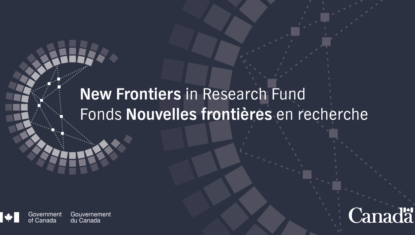04/04/2022
Ottawa, Ontario — Monday April 4, 2022

As announced today by the Canada Research Coordinating Committee, Algonquin College and the CHEO Research Institute have received a $234,492 grant from the Government of Canada’s New Frontiers in Research Fund (NFRF) to further collaborative research.
Delivered through the Canada Research Coordinating Committee (CRCC) and the Social Sciences and Humanities Research Council of Canada (SSHRC), funding is provided through the 2021 NFRF Innovative Approaches to Research in the Pandemic Context competition, which supports Canadian-led research in a post-pandemic context.
The joint application, titled Transforming Health Information, Research, and Scholarship through Technology and Teamwork (NFRFR-2021-00176), explores the novel systematic review (SR) methodology developed by the research team. Specifically, the funding will support integration of a hybrid machine learning human screening approach and real-world validation of the online software platform.
“Through this online software platform entitled insightScope, we open the possibility to change the way scientific communities work together,” said Dr. Dayre McNally, Scientist and Pediatric Intensivist at CHEO, a pediatric health-care and research centre in Ottawa. “By collaborating in this digital space, researchers can both dramatically accelerate the pace of knowledge synthesis and translation and reconcile the networking, education, and career advancement opportunities lost due to the pandemic.”
The platform accelerates the SR process by providing an environment where members of the academic and health communities can meet, create teams, and work together to complete the thousands of tasks required to answer a question. Initial pilot testing saw completion of multiple large SRs though recruitment teams of 10 to 30 researchers, completing the SR process in days to weeks instead of months to years. This means that governments, hospitals, clinicians and the patients they serve are provided timely early access to comprehensive medical evidence on priority topics.
The online platform meets NFRF focus for equity, diversity and inclusion (EDI) by bringing in teams from multiple locations and diverse backgrounds. Alongside with the research partners, Algonquin College has strategic priorities and policies in place to meet EDI objectives.
“Early indications suggest that this platform can provide greater equity, diversity and inclusion in the research endeavor for teams from across Canada and beyond, bringing enhanced educational, networking, scholarship, and career advancement opportunities,” said Kevin Holmes, the Co-Principal Investigator for the grant and Managing Director at Algonquin College’s Social Innovation Lab, part of the Office of Applied Research, Innovation & Entrepreneurship. “This project is a wonderful collaborative effort between Algonquin College and the CHEO Research Institute and showcases the power of partnerships in post-pandemic research efforts.”
Funding is expected to support the research platform through early 2023.
– 30 –
For more information:
Jennifer Ruff
Manager of Communications
CHEO Research Institute
613-261-3979
Bruce Hickey
Communications Manager
Algonquin College
613-513-9935
[email protected]
Kim Blackburn
Communications Officer
Algonquin College
613-291-6581
[email protected]
About Algonquin College
The mission of Algonquin College of Applied Arts and Technology is to transform hopes and dreams into lifelong success. Algonquin College, an Ontario public sector community college, does this by offering hands-on, digitally connected, experiential learning in more than 185 programs. Based in the Ottawa Valley, Algonquin College is the largest polytechnic institute in Eastern Ontario.
About the CHEO Research Institute
The CHEO Research Institute coordinates the research activities of CHEO and is affiliated with the University of Ottawa. The seven programs of research at CHEO RI focus on a full spectrum of pediatric topics. Key themes include cancer, diabetes, obesity, mental health, emergency medicine, musculoskeletal health, electronic health information and privacy, and genetics of rare disease. At the CHEO Research Institute, discoveries inspire the best life for every child and youth. For more information, visit cheoresearch.ca.
Other NFRF Grant Recipients from the CHEO Research Institute:
Implementing a rapid and sensitive method to quantify both SARS-CoV-2 viral load and immunity in communities
Amount: $250,000.00
Principal Investigators: Tyson Graber
Co-Investigator: Alex MacKenzie, Robert Delatolla
Our multidisciplinary team was the first in the world to publicly report daily SARS-CoV-2 (CoV-2) RNA in community wastewaters (613covid.ca/wastewater). Used by Ottawa Public Health, this wastewater-based pathogen surveillance system can anticipate changes in community COVID-19 burden by several days and is thus a valuable adjunct to traditional clinical surveillance methods.
Despite this, day-to-day variability of the fragile viral RNA biomarker has been an issue and the low levels reported often skirt the method’s limits of detection and quantitation. It also does not directly gauge daily levels of “community immunity”, a metric that would be extremely valuable to public health units given the long lead times and logistical complexity of existing serology-based surveys.
To this end, using a highly sensitive, quantitative immuno-linked PCR method called Multiplex Paired-antibody Amplified Detection (MPAD), we have quantified CoV-2 protein in wastewaters at levels in far greater excess of viral RNA. The normalized CoV-2 protein data correlate well with both wastewater-based CoV-2 RNA signal and public health metrics (i.e., PCR testing and hospitalizations). In addition, our preliminary analysis has shown the presence of secretory IgA (SIgA) in wastewater at levels suitable for detection by MPAD.
The objectives of this proposal are to:
1) Validate MPAD assays for quantification of CoV-2 proteins (Spike and Nucleocapsid) and anti-CoV-2 spike protein SIgA in wastewater.
2) Compare sensitivity and reproducibility of protein- vs. RNA-based detection of SARS-CoV-2 in wastewater.
3) Establish a wastewater-derived measure of community immunity and determine any correlation with clinical seroprevalence.
Our established network enables sampling at locations that service indigenous communities and long-term care facilities. These relationships are critical for the successful completion of the objectives. At the same time, deploying these immunoassays in communities will provide actionable information to local public health units.
We believe that quantitative profiling of CoV-2 protein and antibodies from wastewater in rapid time represents a facile and sensitive epidemiological tool to follow community prevalence of fecally-shed pathogens and immunological correlates of protection. As such, the deliverables represent an entirely new epidemiological methodology and tools that can be applied to other infectious diseases, in addition to COVID-19.
